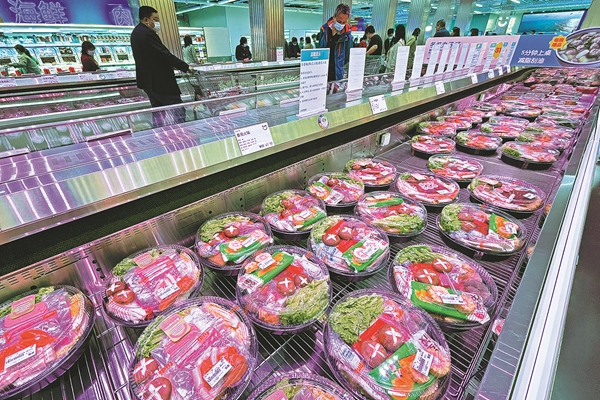Premade cuisine seen expanding by 20%
 0 Comment(s)
0 Comment(s) Print
Print E-mail China Daily, August 17, 2022
E-mail China Daily, August 17, 2022

Chinese consumers have shown an increasing appetite for ready-to-cook dishes as the stay-at-home economy has not only changed people's consumption and eating habits, but also propelled e-commerce grocery platforms to accelerate their push into the burgeoning precooked foods segment, said industry experts.
E-commerce platforms and catering enterprises should ramp up efforts to build complete and highly efficient supply chain systems to ensure freshness and quality, as well as improve on-time deliveries of semi-cooked dishes, they said.
Freshippo, a fresh food chain under Alibaba Group Holding Ltd, is upping the ante in the fast-growing ready-to-cook meals sector, with stock keeping units of premade dishes rising to 25 this year. The company said sales of frozen semi-cooked foods skyrocketed 559 percent year-on-year in May.
It has partnered with premium fresh produce suppliers and established supply chain centers in Wuhan, Hubei province, and Chengdu, Sichuan province, which have been put into operation recently.
"Chinese consumers seem to spend less time cooking, but have a strong demand for finely prepared cuisine," said Zhang Qian, merchandising director at Freshippo's 3R department, which represents providing "ready-to-cook, ready-to-heat and ready-to-eat" meals to consumers. Zhang said semi-cooked dishes require minimum preparation and simple microwave heating, therefore saving people the trouble of cooking.
Market consultancy iiMedia Research said the country's prepared meals saw sales of 345.9 billion yuan ($50.9 billion) last year. The figure is expected to rise at a compound annual growth rate of 20 percent to 516.5 billion yuan in 2023.
Chinese e-commerce giant JD said it will support 20 semi-cooked food brands, each of whose sales revenues is expected to surpass 100 million yuan, as well as five prepared cuisine brands that are likely to see their turnover exceed 500 million yuan, over the next three years.
Turnover of precooked dishes on JD's online marketplaces surged 203 percent during the June 18 shopping carnival, which was just a one-day event when it started but now spans more than three weeks.
Wang Minghui, who is in charge of ready-to-cook dishes at JD's fresh food unit, said the company will deepen its cooperation with production bases of food ingredients, roll out more innovative prepared dishes by working with well-known catering brands, and upgrade its cold chain and logistics services.
In June, JD Super, the online supermarket arm of JD, released standards for prepared portions of fotiaoqiang, a traditional thick soup made of seafood and meat, in collaboration with the China Premade Cuisine Industry Alliance.
"Currently, competition in the low-end premade cuisine segment is fierce, and there is a lack of unified standards related to semi-cooked foods," said Xin Yuan, secretary-general of the China Premade Cuisine Industry Alliance, adding that it is vital to ensure the safety and hygiene of such dishes.
"Most of the ready-to-cook dishes need cold chain transportation and low-temperature storage, which places higher requirements on logistics and cold chain technology. Enterprises should further improve supply chains to ensure the freshness of products and fulfill timely deliveries," said Chai Zhenzhen, an analyst from the JD Research Institute.





